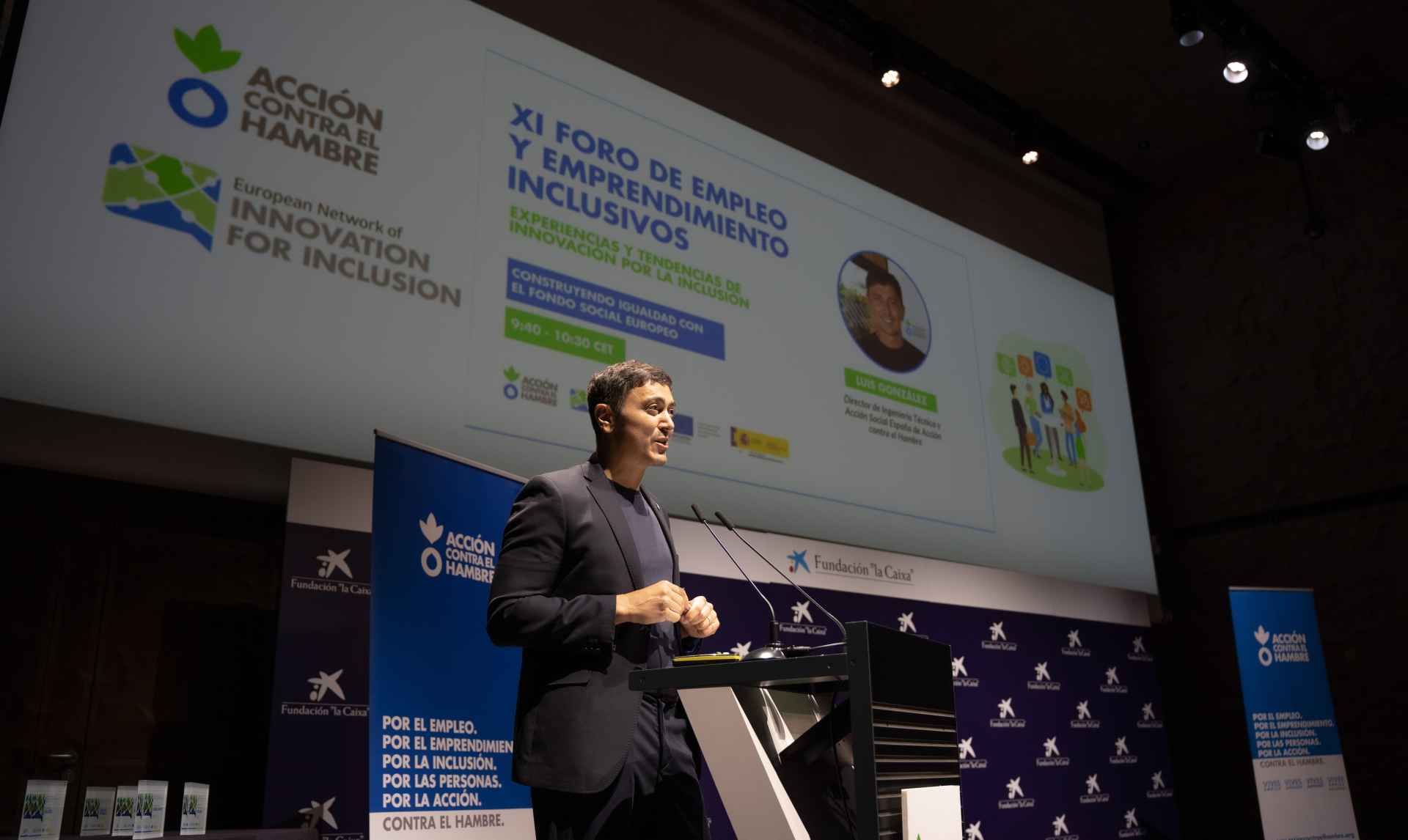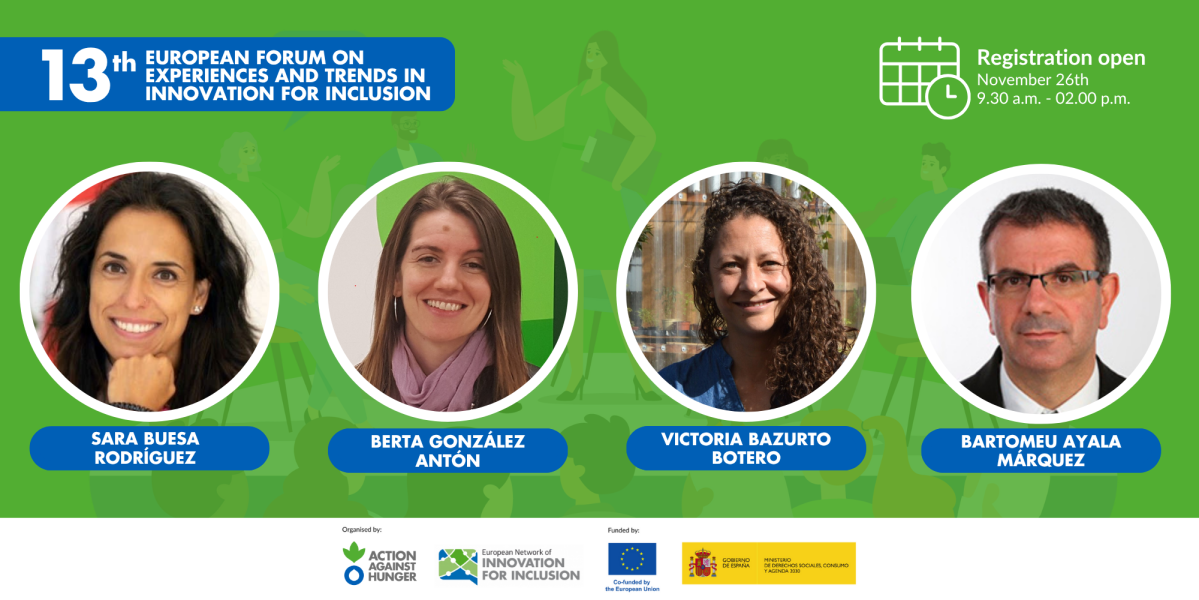

Tools, strategies and scaling social innovation to achieve real impact
Transforming ideas into real, lasting change requires more than creativity. Effective social innovation relies on clear methodologies, practical tools, and well-defined strategies that enable projects to be implemented, measured, and scaled with enduring impact. The 13th European Forum on Experiences and Trends in Innovation for Inclusion, taking place on 26 November in Madrid and online, will bring together professionals, policymakers, and project managers to explore how evidence can guide effective decision-making and how these approaches can be applied to initiatives fostering inclusion, social change, and community cohesion.
Register now and don't miss our European Forum
The European Social Fund Plus (ESF+) 2021–2027 has set a new standard for social innovation in Europe. Projects funded by ESF+ are required to demonstrate measurable impact and adopt scaling strategies to ensure effective solutions can be replicated and sustained over time. Yet, measuring impact and ensuring project sustainability remain major challenges, that require strategic planning, clear indicators, and cross-sector collaboration.
Managing social innovation to deliver impact
The OECD’s report “Start, Scale, Sustain” (3S Framework) provides a practical guide for supporting social innovation projects through all stages. This approach enables the piloting of initiatives, their expansion to new regions or target groups, and their long-term incorporation into public policies and institutional systems. Each stage demands careful planning, resources, and strategic partnerships, alongside mechanisms to preserve the project’s core value as its reach grows.
Measuring impact and generating evidence is a critical component. Using systematic, clear indicators allows projects to evaluate their effectiveness, build trust with funders and partners, and inform public policy decisions. Examples like Genio in Ireland demonstrate how solid evidence helps integrate innovations into existing social systems, ensuring that outcomes extend beyond local pilots and create structural change.
Equally important is mapping key stakeholders and engaging communities in co-creation. Identifying key decision-makers and engaging them from the start enhances the chances of adoption and long-term sustainability. Collaboration with municipalities, social organizations, businesses, and academia ensures that innovations adapt to local contexts without losing their essence, enabling coherent replication across different territories.
Strategies for maximizing impact
Experience from the European Network of Innovation for Inclusion, led by Action against Hunger and supported by resources like the European Commission’s Scaling-up Social Innovation Toolkit (2022) and the OECD’s Starting, Scaling and Sustaining Social Innovation report, shows that the effectiveness of social projects depends on the interconnected implementation of four strategic elements:
- Early engagement of decision-makers: Involving public authorities and policymakers from the start increases adoption and ensures continuity. Presenting evidence at the right moment in the legislative cycle helps integrate innovations into policies and programs effectively.
- Local adaptation without losing core value: Each community has specific needs. Social innovations must be tailored to these contexts while maintaining their central purpose, enabling successful replication in other regions.
- Continuous evaluation and feedback: Measuring outcomes, learning from results, and adjusting strategies in real time improves project effectiveness and ensures that results are scalable and replicable.
- Cross-sector collaboration: Engaging multiple actors — municipalities, NGOs, businesses, and academia — enhances synergies, strengthens social cohesion, and transforms projects into drivers of structural change.
These strategies are most effective when combined and implemented as part of a shared vision for systemic change.
Social innovation and sustainability in Europe
Since 2016, Action Against Hunger has led the European Network of Innovation for Inclusion, with ESF+ support in Spain, to promote social innovation and strengthen labor market inclusion across Europe. The Network provides a collaborative space that brings together organizations from different sectors, facilitating knowledge exchange, co-creation of projects, and the scaling of social innovations. This approach reflects a commitment to systemic transformation, supporting the journey from local experimentation to influence on European public policies.
ESF+ does more than fund projects: it encourages integrating innovations into sustainable policies, promoting the use of digital collaboration platforms and impact measurement methodologies. Initiatives such as the Alpine Space Programme combine social innovation with both the green and digital transitions, demonstrating how scalable solutions can enhance systemic impact and contribute to EU objectives.
13th edition of our European Forum
The European Forum on Experiences and Trends in Innovation for Inclusion will provide professionals, project managers, and public authorities with insights on turning innovative ideas into solutions with tangible, lasting impact. Participants will explore practical methodologies, measurement indicators, digital tools, and systemic adoption strategies. They will also have the opportunity to learn from successful initiatives across Europe, connect with experts, and establish collaborations that facilitate the replication of their projects.

Read more about the event
Register here
Social innovation is not an isolated process. It is a strategic journey that combines creativity, evidence, collaboration, and planning. Projects that apply these tools and strategies are better equipped to strengthen communities and become European benchmarks for systemic change.
